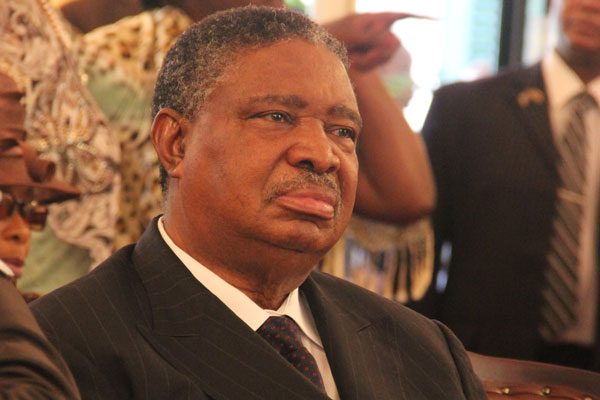
VICE-President Phelekezela Mphoko’s alleged 300-day stay at a top Harare hotel dominated debate on next year’s budget, as taxpayers singled it out as an example of wasteful government expenditure.
BY VENERANDA LANGA
Mphoko and his family have reportedly been staying at the luxury hotel since his surprise appointment last December — at the expense of taxpayers.
Harare residents told the Parliamentary Portfolio Committee on Finance and Economic Development, currently gathering people’s views ahead of the formulation of the 2016 national budget, that government must put a cap on the time officials can stay in hotels.
Naboth Musanhi, an indigenous businessperson said it boggled people’s minds why government officials were allowed to stay in hotels for months without looking for proper accommodation.
“It is incomprehensible to see a whole Vice-President of an ailing country living at a hotel for more than 280 days, paid from taxes coming from the people,” Musanhi said.
“We recommend that ministers and top officials should be allowed to live at a hotel for only one month while they look for suitable accommodation.”
Mphoko became VP in December last year, and in January, media reports alleged that he was offered a house in Mandara where the late Vice President Joseph Msika used to stay, but he refused it after his wife, Laurinda, allegedly demanded a new house suiting their tastes.
- Chamisa under fire over US$120K donation
- Mavhunga puts DeMbare into Chibuku quarterfinals
- Pension funds bet on Cabora Bassa oilfields
- Councils defy govt fire tender directive
Keep Reading
The VP and his wife were said to have gone shopping for another house in places like Glen Lorne, Borrowdale Brooke and Ballantyne Park, but they reportedly found nothing suitable despite the fact that the properties in these areas are exquisite and attract prices ranging from $1,5 million to $3 million.

Mphoko has been staying at the hotel together with his wife and grandchild, a situation members of the public said was untenable as the country was reeling in economic hardships.
Another high-profile person who has used hotel accommodation for almost two years is Deputy Speaker of the National Assembly, Mabel Chinomona.
Musanhi also said Parliament should stamp its authority on ministers who refused to appear before it to answer on issues of misuse of public funds.
“Some ministers refuse to appear before Parliament to answer on diamond revenue and the youth funds. We are the voters and we have the power to remove that person because we need accountability,” he said.
Another member of the public suggested that Finance minister Patrick Chinamasa should introduce a fund to support people affected by housing demolitions so they do not suffer the consequences of homelessness.
Tapiwa Mubondiri, another resident, suggested ways of harnessing funds to support sporting activities in the country. The Zimbabwe Football Association is struggling to finance football activities.
“Nowadays there are several sports betting places in Harare and I feel these should contribute a fee to the Sports and Recreation Council.
“They should share some percentage of their profits with the SRC, or a percentage of their shareholding,” Mubondiri said.
An elderly Harare resident, Bhaki Pazandora said there was need to plug loopholes to curb corruption, which was affecting ordinary people and milking the country of its resources.
On electricity problems, people suggested that energy should get the bulk of the budget cake.
Miriam Jimu said lack of electricity had drastic effects and was affecting schoolchildren who were forced to eat cold meals.
“Women end up feeding children with cold meals due to lack of alternative sources of energy and it is affecting the children’s health,” she said.
The influx of Chinese products into the country was also frowned upon, with people saying Chinamasa should place measures to incentivise local industries that were losing business to the Chinese.
“The only industries that are working in Zimbabwe are transport, funeral parlours and Bakers’ Inn because people will always need bread.
“Right now the Chinese are flooding the country selling cheap clothes and killing business by our local tailors who were retrenched from industry,” said Misheck Mutandwa.
Another contributor who did not identify himself said Chinamasa should also ensure an investigation was carried out to establish if Chinese nationals were banking money in the country. He alleged they were not doing so.
“Chinese companies are running mining companies and they are banking money outside this country. I think we should have a re-look at the Look East Policy to see if it is yielding any results,” he said.
An elderly person — Stanley Mutamba — suggested there was need to review old people’s pensions.
“We earn a meagre $60 per month. However, we have to take care of orphans,” Mutamba said.
“Other countries take care of their aged and when Chinamasa wakes up from his slumber, we want him to think of the aged because everyone will one day grow old.”










